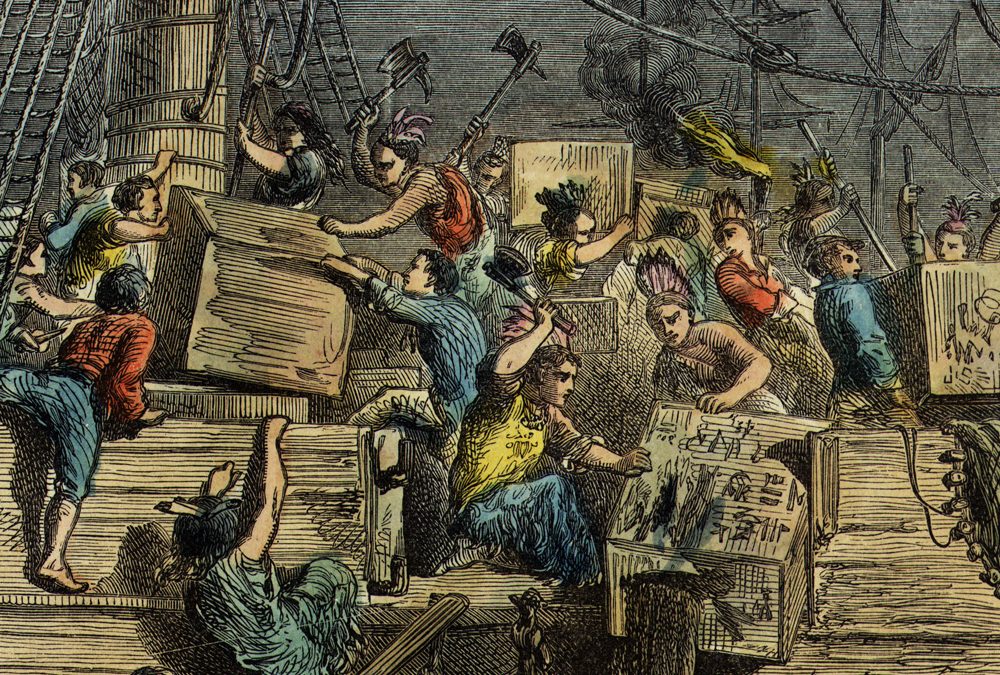On December 16, 1773, American colonists in the city of Boston took a rise against the tyrannical rule of the hegemonic British empire and it’s unruly taxes by dumping more than 340 tons of imported British tea into the Boston Harbor. Why do you ask? The American colonists found it unfair and unjust that they be taxed on goods without their consent, acceptance, and without proper representation in Parliament. This event was not just happen out of nowhere. There were events that took place long before this day that had the colonists angry and fed up with the British. In 1768, the British Parliament enacted the Townshend acts that put a tax on imported goods to the thirteen colonies. Such essential items as glass, lead, paint, paper, tea and so on were to be taxed causing the colonists to pay even more for these items necessary for everyday life. This was the first act by the British crown upon the American colonists to raise British revenue. Americans loved their tea and with the British tax – put in place by the British owned East India Trading company – they had to find other ways to acquire it. In such instances, American colonists who were involved in smuggling of imported tea teamed up with Dutch smugglers and began acquiring tea the illegal way:
Tea was in many respects a perfect article to smuggle through this illicit network—it was lightweight, valuable, subject to heavy British duties, and high in demand. All around the eighteenth-century British empire, people wanted tea. The British East India Company technically had a monopoly on wholesaling tea in Great Britain, and in return for its monopoly privileges, the British treasury extracted high duties on tea sales.[1]
What the British empire failed to realize was with this tax in place they had caused anger and unrest with the American colonists and it would ultimately end in one of many uprisings against the British empire and spark the beginning of the American Revolution.
On the day of the Boston Tea Party the feeling of tenseness was in the air and the population of Boston was on edge. A crowd was gathered in the largest church in Boston and among the crowd was a man named Adam Collson. While the crowd was gathered, Adam Collson shouted, “Boston Harbor a tea-pot this night!” Upon his shouting, men both young and old, even boys (all part of the famous Sons of Liberty) dressed as Native Americans, hopped onto British ships docked in Boston Harbor and proceeded to dump more than 340 chests equaling over 46 tons of exotic British tea into the murky water as an act of defiance against the tyranny of the British. In the book titled, Defiance of the Patriots, author Benjamin Carp discusses the type of men involved in this act of rebellion:
The tea destroyers hailed from all walks of life. Men with strong backs and hard Yankee accents, they were a mix of young merchants, craftsmen, apprentices, and workers. They believed in a wrathful God, and they feared that the temptations of tea would turn them into tools of a corrupt, tyrannical empire. The grown men among them believed they were embarked on a noble deed of patriotic virtue. The younger boys thrilled to the idea of an evening spent wreaking chaos and destruction.[2]

Questions were asked why the men and young boys were dressed as Native Americans while they were dumping tea into the harbor. They chose to dress as Native Americans to hide their identities and to fool the British redcoats if they had been caught. The courage of Adam Collson, other citizens of Boston and the individuals who boarded the British ships filled with tea, unbeknownst to them at the time, were part of one of the most famous rebellions of our nation’s history and paved the way for many more uprisings against the British crown.
Many people do not know that the Townshend Acts were eventually repealed before the incidents that took place on December 16, 1773 but the colonists were still upset that tea was still being taxed.

The news of the partial repeal caused great rejoicing in the great trading towns in the colonies, and the non-importation agreements, which had been launched against the Townshend taxes, were modified to operate against dutied tea only.[3] Still, this was enough to anger the colonists and defend their god given rights.
It is without a doubt that the brave men and women involved in all the acts preceding the Boston Tea Party, the individuals who took place during it and the people who continued to act in defiance to the British empire paved the way for the American Revolution and the birth of a new country, The United States of America.
[1] Carp, Benjamin L, “Did Dutch Smugglers Provoke the Boston Tea Party?” Early American Studies, (2012): 339
[2] Carp, Benjamin L, Defiance of the Patriots: The Boston Tea Party and the Making of America (Yale University Press, 2010) 2
[3] Schlesinger, Arthur Meier, “The Uprising Against the East India Company.” Political Science Quarterly 32, (1917): 60
